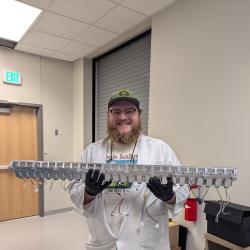UMD Offers New Minor in Quantum Science and Engineering
The University of Maryland will offer a new minor in quantum science and engineering beginning in spring 2025. Students in the minor will learn about quantum computing technologies, algorithms for quantum computers, characteristics of quantum materials, and sensing and noise in quantum systems.
“Our new quantum minor complements our well-recognized strength in quantum research and helps prepare our undergraduate students to join the workforce in this emerging field or attend graduate school and contribute to future quantum research,” said Sennur Ulukus, chair of UMD’s Department of Electrical and Computer Engineering (ECE).
Undergraduate students in the A. James Clark School of Engineering and College of Computer, Mathematical, and Natural Sciences (CMNS) will be eligible to enroll in the minor. Applications will be accepted online from October 28, 2024 to December 6, 2024. The minor was created through a multidisciplinary collaboration between the departments of ECE, physics, computer science, materials science and engineering, and mechanical engineering.
“With this new program, we are significantly enhancing the set of courses on quantum topics for UMD undergraduates. The minor will let students approach quantum science and engineering from different angles and explore the subject deeply,” said Andrew Childs, a professor in the Department of Computer Science and the University of Maryland Institute for Advanced Computer Studies.
The new minor adds to UMD’s quantum education offerings, which include a quantum information specialization for computer science majors and quantum computing master’s and graduate certificate programs.
“Quantum information science is inherently multidisciplinary, going beyond just physics,” said Steve Rolston, chair and professor of the Department of Physics. “This minor will allow students throughout CMNS to learn about quantum.”
In addition to academics, UMD is a hub for quantum research and development. Over 200 quantum scientists and engineers at the university are exploiting the unique properties of quantum physics to usher in a new age of technology: quantum computers capable of currently intractable calculations, ultra-secure quantum networking and exotic new quantum materials.
The quantum enterprise at UMD includes the following:
- Joint Quantum Institute
- Joint Center for Quantum Information and Computer Science
- Quantum Startup Foundry
- Quantum Technology Center
- Quantum Materials Center
- Condensed Matter Theory Center
- LPS Qubit Collaboratory
- NSF Quantum Leap Challenge Institute for Robust Quantum Simulation
- National Quantum Laboratory (Q-Lab)
- Mid-Atlantic Quantum Alliance
The Q-Lab will also provide equipment for two lab courses offered in the new minor, one focused on quantum hardware and the other focused on quantum software. The courses will give students a physical appreciation for what quantum can do on top of the math and science theory they will learn in their lecture courses.
“We’re not just teaching students about quantum mechanics. We’re preparing them to think in ways that bridge the classical and quantum-computing worlds,” said ECE Professor Patrick O’Shea, director of quantum education programming. “We educate our students to be creative quantum explorers, not just quantum-tourists.”
Adapted from text provided by the Department of Electrical and Computer Engineering.







